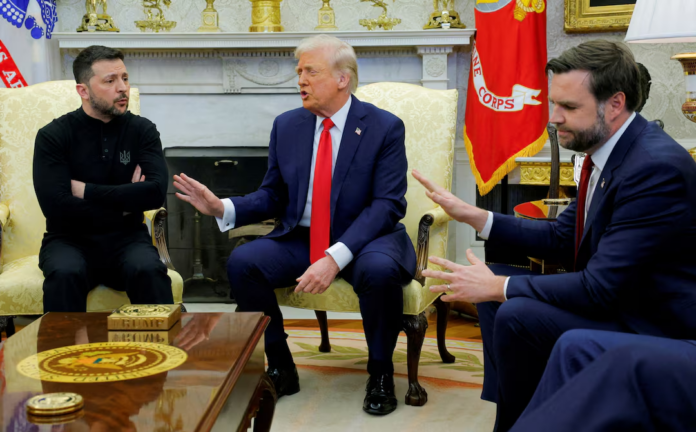A proposed minerals deal between Ukraine and the United States was left unsigned after a heated exchange between U.S. President Donald Trump and Ukrainian President Volodymyr Zelenskiy in Washington on Friday.
The agreement, which aimed to facilitate U.S. investment in Ukraine’s lithium sector, was seen as a step toward reducing Kyiv’s reliance on China while helping Ukraine’s war-battered economy.
During their Oval Office meeting, Trump positioned the deal as a way for America to recoup some of the financial aid and weaponry sent to Ukraine since Russia’s invasion three years ago. Zelenskiy, however, pushed for stronger security commitments, emphasizing that without guarantees, investors would remain hesitant.
The discussion quickly turned confrontational.
“You’re not in a good position. You don’t have the cards right now,” Trump told Zelenskiy, who countered, “I’m not playing cards, I’m very serious, Mr. President.” Trump insisted that a deal with Russian President Vladimir Putin was possible, but Zelenskiy dismissed the idea, stating, “Make no compromises with a killer.”
The fallout from the meeting dashed Ukrainian hopes of securing U.S. backing for its mining sector. The deal was expected to unlock significant investment, helping develop the Polokhivske lithium deposit, one of Europe’s largest.
The deposit, located 240 km from the frontline, remains undeveloped due to security risks and a lack of funding.
A draft of the deal reviewed before the meeting indicated that Ukraine would contribute 50% of future revenue from state-owned natural resource monetization to a U.S.-Ukraine Reconstruction Investment Fund. However, it contained no security guarantees, a key demand from Kyiv.
Despite the failure to sign the agreement, Ukraine remains a critical source of minerals classified as strategic by the U.S. government. It holds deposits of 22 of the 50 minerals deemed essential, including lithium, titanium, and rare earth elements.
However, detailed geological surveys have not been conducted in decades.
With no immediate deal in place, the U.S. is unlikely to make a meaningful challenge to China’s dominance in the global lithium supply chain. China, already the third-largest lithium producer, controls over 90% of rare earth processing, creating a bottleneck for countries looking to diversify supply.
As the meeting ended, Trump made it clear that without a shift in Kyiv’s stance, U.S. support was not guaranteed. “You’re either going to make a deal, or we’re out,” he told Zelenskiy.
After a tense exchange, U.S. officials instructed the Ukrainian delegation to leave, cutting the meeting short. With the minerals deal stalled, Ukraine now faces greater uncertainty over both investment in its natural resources and continued U.S. military support.




